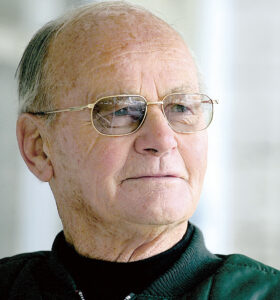Comment
Larger than life
He was a formidable character. Ready to pounce at the whiff of an insult. Just as quick with a kind word or gesture of thoughtfulness. Keith MacDonald passed away on the weekend, leaving behind stories and memories much bigger than one man.
A competitor all his life, Keith’s success in hockey was earned mainly in the corners. Bruising. Grinding. Intimate. Unrelenting. Personal. Bear in mind, the corners of the Memorial Arena were not smoothed out semicircles like modern rinks. Instead, these unforgiving vortices of pain fashioned from simple plywood sheets fastened to a crude hexagonal corner topped with chicken wire were designed to protect the spectators from the puck and the violence perpetrated in front of them. This is where Keith did business.
He helped his team, the Belleville McFarlands, win the national championship in 1958. That earned the team the right to represent Canada at the Ice Hockey World Championships the following year. He was on the team that travelled to Prague the following year and won the world championship. But by then, the team had loaded up with some of the nation’s best players to compete in this international tournament. This left Keith with limited ice time in the international series. However, it did nothing to diminish his celebrity as the “local” boy on this world-beating team. A fact emphasized by the lavish 50th-anniversary celebrations in 2009.
 Keith farmed the land between West Lake and Athol Bay—mostly raising cattle. Hard work. Punishing. A strong work ethic, a powerful sense of community, irrepressible confidence and an eagerness to mix it up in the coffee shop or over the tailgate of a pickup likely made it inevitable that Keith and politics would intersect. He was elected to Hallowell Township council in the early 1970s and remained a fixture of County politics for the rest of his life.
Keith farmed the land between West Lake and Athol Bay—mostly raising cattle. Hard work. Punishing. A strong work ethic, a powerful sense of community, irrepressible confidence and an eagerness to mix it up in the coffee shop or over the tailgate of a pickup likely made it inevitable that Keith and politics would intersect. He was elected to Hallowell Township council in the early 1970s and remained a fixture of County politics for the rest of his life.
Prince Edward-Lennox had been a relatively safe Conservative seat in the provincial assembly since the 1930s. Still, that fact did nothing to discourage Keith from running for the Liberals in 1975, coming within 732 votes of knocking off James Taylor, who would later become the first mayor of the amalgamated County.
Keith went back to the farm and township matters. It would be 13 years before he would take another shot. This time he defeated Dennis Tompkins, running under the Conservative banner. Keith went to Queen’s Park under David Peterson’s leadership. But before his term was up and eyeing a surge in the polls, Peterson called a snap election. Ontario voters rebuked Peterson’s crass political calculation by electing an NDP government, including Paul Johnson in Prince Edward-Lennox. Keith was out of provincial politics, this time for good.
Keith was elected to the first council of the amalgamated Prince Edward County and served for another 14 years. His time on council was punctuated by fierce outbursts precipitated by a feeling either he or the folks of Hallowell were being slighted or shortchanged. More than a few times, his seatmates had to restrain him from climbing over the horseshoe-shaped table to confront his opponent. When words wouldn’t suffice.
By the last few terms, he let the few remaining concessions to council procedure or decorum he’d adhered to fall away. By then into his 80s, he would regularly interrupt a council meeting to bring up something a constituent had brought to his attention earlier that day.
“I know I am probably out of order,” he would interrupt and then go on to detail a problem with a road, a severance, or a ditch. And demand a response. As the senior member of council, Keith was accorded license to speak out of turn or to an item unrelated to the agenda.
But there was more to it than simple seniority. Keith had a warmth and grace that stood in sharp contrast to his gruff exterior and direct manner. It afforded him latitude that no other member had. Then or since.
His words often escaped his lips before his brain had fully grasped their impact, forcing him to clean up a careless remark. But he did so honestly and with seemingly genuine remorse. Unaccustomed to seeing his comments printed in the local paper, he bristled at the intrusion into what he saw as the cut and thrust of politics. Yet he never missed an opportunity when we encountered each other in non-political circumstances to say that he appreciated the newspaper’s role in telling the stories of County council and local politics. I believed him. I believed that he was both the fierce competitor and the kind man. Embodied in the same person.

Comments (0)